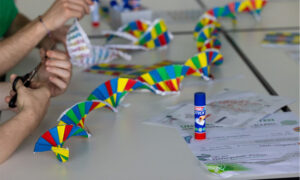
Read the latest Issue
Rutuja Yelmar, predoctoral Fellow at EMBL Grenoble in the Kowalinski group, talks about her passion for research, daily inspiration, and the importance of collaboration in achieving her goals

Rutuja Yelmar was recruited through the EMBL International PhD Programme (EIPP) in 2020, and has just entered her third year as a predoctoral fellow at the Kowalinski group. She conducts research on Trypanosoma brucei, a parasite that belongs to a group called kinetoplastids, and causes the African sleeping sickness disease. In this interview, she shares her passion for research, describes what it’s like to be a PhD student at EMBL Grenoble, and the intertwining between science and teamwork.
We’re studying RNA editing, a crucial stage of RNA processing that expands the diversity of RNA sequences through the deletion, addition, or modification of RNA segments. The process of RNA editing involves intricate mechanisms performed by complex molecular machines. In our laboratory, our initial objective is to investigate the molecular-level structure of the proteins involved and how they interact with each other.
We are studying this process in Trypanosoma brucei, a parasite that causes diseases that can be deadly in humans and animals and current treatments for which have severe side effects. Therefore, understanding how this parasite works at the molecular level can help us develop better therapies and better grasp the RNA editing process in other organisms as well. These are our long term goals, and I am trying to find answers to one of these questions by characterising helicase enzymes involved in the RNA editing process.
Lots of things. One of the best is definitely the research infrastructure. EMBL Grenoble is a cutting-edge institute in structural biology – we have access to cryo-EM microscopes from low to high end, along with the eukaryotic expression facility, just to mention some of the incredible instrumentation and facilities. These are amazing platforms in themselves, but I also really appreciate how easy it is to connect with other scientists here, which I find crucial to doing great science. At EMBL Grenoble, the research groups have great opportunities to connect and share their expertise with everyone. Here, everybody knows each other! Although I’m working on my personal project, I feel like everybody contributes to it a little bit, by giving me pieces of information, suggestions, or topics for reflection.
Witnessing proof of concept throughout my work – moments like these are priceless. It takes time, but seeing the validation of a particular experimental idea makes me excited. You know, science is a trial and error game, and even the times when something isn’t working can be interesting. For me, even these moments are an opportunity to learn and try new methods, and to have fruitful conversation with other PhD students, which is also a fun part of science.
I look up to women scientists the most. Rosalind Franklin is definitely one of my heroes – we owe the unravelling of the molecular structure of DNA to her and her colleagues, a breakthrough that is central to our modern understanding of genetics and biology.
There’s also another person whose life story truly inspires me, Anandi Gopal – India’s first female doctor. She received her degree in western medicine at the age of 21 after having left India to move to the US to be able to pursue these studies, and she managed to do all of that back in 1872, when women were not allowed to become doctors in India. She pursued her passion, irrespective of societal obstacles or biases, with a determination that I truly look up to.
I’ve had a passion for biology since my childhood. My biggest question has always been how does life happen. I’ve always been fascinated by microorganisms too – those tiny, single-celled, independent organisms that carry out their own metabolism for survival. I think this childhood interest transformed into a genuine drive to pursue scientific research, right from the beginning of my university studies. Since then, publishing insightful science in a journal became one of the items on my bucket list. It took me 7 years to get there, and I look forward to continuing to push the boundaries of fundamental knowledge.
Sports and poetry. When I first moved to Grenoble, I quickly realised how big a role sports play in people’s lives here. I became sportier myself when I decided to break out of my comfort zone and learn how to climb indoors and run – which have both been great learning experiences and a lot of fun. I’m also passionate about writing poetry, both in Marathi – my mother tongue – and recently in English too. My first poetry book was published a couple of years ago, and this for me is not only a form of artistic expression but also a great emotional outlet.
Looking for past print editions of EMBLetc.? Browse our archive, going back 20 years.
EMBLetc. archive